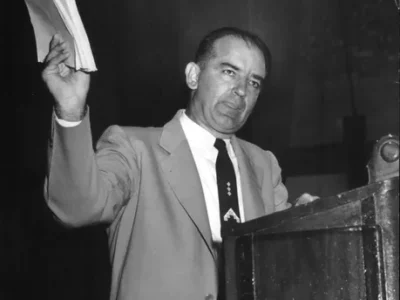DeSantis and the Environment
A Little Bit of Nepotism and a Lot of Everglades Protection.
Compared to Donald Trump, Ron DeSantis is practically a Greta Thunberg on environmental issues. Of course, by the same token, I’m practically a Steph Curry on the court compared to Danny DeVito.
Sarcasm aside, DeSantis is pretty good on environmental issues for a Republican. But he rarely mentions climate change, and his record on renewable energy is a cipher. One thing we do know, however, is that he’s not above a bit of shameless nepotism when making important energy appointments.
The biggest thing in DeSantis’s favor is his position on the Everglades, where he’s garnered applause from conservationists. He has backed $3 billion in spending on the Everglades and water quality improvements. DeSantis has also been good on climate adaptation. As Time magazine reports:
“DeSantis has championed a program to funnel hundreds of millions of dollars to communities across the state to help them prepare for the sea level rise and worsening flooding that will result from climate change. The Little River area has alone received commitments of more than $25 million in state funds. ‘The governor [wants] to deliver results to real problems that exist right now,’ says Wesley Brooks, who DeSantis appointed as the state’s Chief Resilience Officer to oversee climate adaptation efforts, ‘and set the stage for better preparedness in the future.’”
DeSantis tends not to say much about what’s actually causing climate change. He does admit there’s a “human contribution” to global warming. In terms of renewable energy, he has also tended to stay mum. He did rather dramatically veto a bill designed to practically shut down rooftop solar in the state. That’s an important step given that, despite calling itself the “Sunshine State,” Florida has lagged behind in making any use of all that sun to generate power.
In search of more enlightenment, I took a look at the DeSantis appointee to the state public service commission. One of his appointees was actually a reappointment, having served on the commission for four years. Prior to that he had been a deputy secretary in the state EPA.
The other was . . . let’s say, a bit different: a 2019 law school graduate who had spent a couple of years in the commission’s legal office. But surely, you must be thinking, there must have been something to distinguish her from the other 33,000 people just out of law school.
And you would be right about that. By the sheerest coincidence, her mom is the president of the state senate. “One hand washes the other,” as Tony Soprano was wont to say.
And there you have it. Ron DeSantis, defender of the Everglades and kindly patron to struggling young lawyers.
Reader Comments
4 Replies to “DeSantis and the Environment ”
Comments are closed.







OK Dan, you exposed what is really going on, or not in Florida.
Now it is way past due time for UC to use extreme urgency to implement your recomendation;
“Where Berkeley falls short, in my view, is that there’s little leadership from the top and little structure at the campus level to organize climate efforts”
Why hasn’t that happened yet!?
Dan, with all due respect, our children can no longer wait for the solutions to global warming to be implemented in time because 2022 we have already suffered incredibly destructive climate change caused disasters.
My wife and graduated from Cal in the 60s when we fought for ERA and still don’t have that (nor Roe v. Wade) today. We also fought for the FSM and today we cannot have “conversation”s on Berkeley Blog any longer (Thank You for still allowing them on Legal Planet).
What does it take to motivate universities to do the right things to protect our newest generations after COP 27 and 2022 proved beyond all doubt that we are already losing the battle for survival with increasingly out of control numbers of deaths and destruction?
Never, Never, Never Forget that Academics are our Last Resort for Saving The Human Race From Global Warming! Thank you for your efforts.
Anthony, check out grants and funding for scientific research at universities and see how much money comes from fossil fuel companies and you might find an answer as to why universities or academics sometimes do not push climate action very much.
What is totally ignored is Article II, Section 7 of Florida’s constitution, which requires polluters, not taxpayers, to pay for Everglades cleanup. Polluters give the political contributions and the Constitution, clear on this issue since 1995 remains an unenforced gaggle of words.